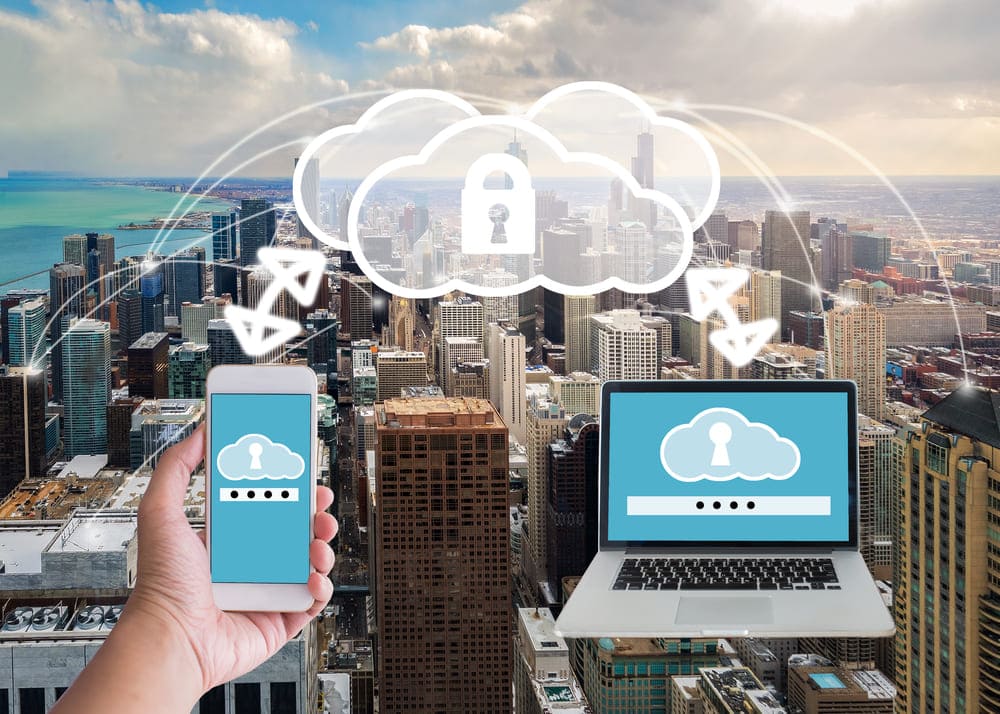Cloud computing is one of the key drivers for achieving an organization’s mission, according to Gartner, and is finally becoming a new norm. As a result, cloud spending will continue to grow, making it the top investment area for enterprises in 2019.
Interestingly enough, cybersecurity is the second major spending item quoted by the CIOs in the same survey. Looking back at all of the cyber attacks and data leaks that happened in 2018, it comes as no surprise as businesses are increasingly looking to address the main security issues in cloud computing.
If you are a savvy business owner planning to face the cloud security challenges, make sure you are well-prepared. First off, let’s start with the cloud security definition and what it means for your business.
What is cloud security and why should you care?
Cloud security means keeping your data stored online safe, i.e. preventing it from being stolen, leaked or deleted.
Security is a major roadblock for cloud migration, and remains the top concern for IT professionals all over the world. Now, as data protection regulations are becoming more stringent, the inability to comply with them and keep your users’ information secure can cost you dearly.
According to the recent study by the Ponemon Institute, the average cost of a data breach worldwide now equals $3.86 million – $148 per compromised record. However, the numbers vary greatly from country to country: from $7.9 million in the USA, for example, to $1.24 million in Brazil.
Yet, when it comes to security, timing is everything: the earlier you detect and fix the problem, the better. Namely, organizations that manage to address a breach in less than 30 days tend to save up to $1 million, on average.
As you can see, knowing about the possible dangers and being ready to react to them fast can be a real lifesaver. So, here are the top security issues in cloud computing you should be ready to face.

The top 7 cloud computing security threats you need to be aware of
While most business owners agree that the cloud environment is more secure than an on-premise infrastructure, there are still many concerns to address.
So, what are the biggest security risks of cloud computing?
1. Data Breach
A data breach (or leak) is possibly the most widespread cloud security concern. It usually happens as a result of cloud computing security attacks, when unauthorized users or programs gain access to confidential data and can view, copy, or transmit it.
2. Data Loss
Unlike data breaches, data loss often happens due to natural or man-induced disasters, as a result of the physical destruction of the servers or human error. However, it can also be a result of a targeted attack. Regardless of the cause, the result will be the same: you lose all of the data you’ve been collecting for years.
3. Denial Of Service (DoS)
Another popular type of cloud computing security attack, a Denial of Service (DoS) attack can shut down your cloud services, making them temporarily (or indefinitely) unavailable to your users. This can be done by either flooding the system with extensive traffic, which the servers simply can’t buffer, or crash it by taking advantage of the bugs and vulnerabilities.
4. Cryptojacking
A relatively new cloud security threat, cryptojacking was widely adopted last year, largely due to the growing cryptocurrency frenzy.
In this type of cloud computing security attack, hackers use your computing resources to process cryptocurrency transactions by installing a crypto mining script on your servers without your consent. This leads to an increased CPU load and, as a result, can significantly slow down your system.

5. Account Hijacking
Even if your employees aren’t using default, insecure passwords, hackers still can “guess” the credentials, gain access to your cloud using your staffs’ accounts, and, as a result, steal or manipulate your data or sabotage your business processes in general. This is called, “account hijacking.”
6. Insecure APIs
Even if your own systems are safe, there are often third-party services that can introduce additional cloud security risks. Namely, IoT solutions are typically considered a threat to data privacy: devices, such as connected cars, health monitors, and home appliances, collect and transmit tons of sensitive data in real time. As a result, intruders can hijack your data by hacking your APIs, not the cloud itself.
7. Insider Threats
Apart from external security threats in cloud computing, there are enough internal risks. For example, your own employees can cause privacy violations or major data leaks. This can be due to targeted malicious behavior or simply a result of human error. Moreover, they can serve as an entry point for malware, e.g. by using their devices for work-related tasks as a part of the BYOD policy.
Cloud security best practices: How to avoid major security threats in cloud computing
Despite understanding how dangerous security threats in cloud computing can be, 24% of companies surveyed by RedLock still have hosts missing high-severity patches in use. What’s more, almost half of them don’t even have encryption in place to protect their databases.

If you are looking to protect your infrastructure from the threats listed above, consider adopting the following cloud security best practices as soon as possible.
- Conduct a cloud security assessment regularly. Review your cloud infrastructure once in a while (and not only if something happens) and make sure to keep it up to date. Also, choose only reliable cloud providers and trusted third-party tools.
- Implement cloud security monitoring. Automated threat detection using Artificial Intelligence can help you identify and react to potential dangers instantly, and as a result, lower your operating costs. According to a study by the Ponemon Institute, AI-based cybersecurity solutions help companies save on average $2.5 million.
- Establish solid access management policies. Only provide access permission to employees who need it, and make sure you can revoke it at any time, especially if your organization employs contractors and part-time workers. For an additional level of security, consider multi-factor or biometric authentication methods.
- Create a disaster recovery plan to avoid data loss and minimize the downtime after a disruption. Also, don’t forget to backup your data regularly and often.
- Encrypt your data before uploading it to the cloud (and keep it encrypted both when stored and in use).
- Consider edge computing for IoT. It is much harder to steal or compromise data which is decentralized and stored “at the edge” of your network, rather than in the cloud.
- Raise employee awareness about cloud security risks. According to the Oracle and KPM research, 82% of organizations are concerned that their employees are violating cloud service policies.
Hire cloud security professionals to keep your business safe
According to the Skyhigh research, an enterprise experiences on average around 23 cloud-related threats every month. So, if you still think that your business is safe, think again.
First of all, it is important to allocate sufficient resources to support your cloud security efforts. Of course, having a dedicated security budget is a must. However, you need to think about human resources too: appoint an expert CTO/CIO to take charge of your cybersecurity strategy, hire experienced security architects, engineers, testers, etc.

However, if you don’t have the required talent in-house, hiring cybersecurity specialists can be a real challenge. According to the ESG survey, cybersecurity tops the list of skills in deficit: 53% of the surveyed organizations struggle to source the necessary talent.
So, if you are looking to augment your staff with security professionals, consider hiring a dedicated team at Eastern Peak. Our specialists can help you assess your current state of cloud security and come up with future-ready solutions to ensure the highest level security across your infrastructure.
To discuss the benefits of our cooperation and get professional advice for free, contact us now.
Read also:



